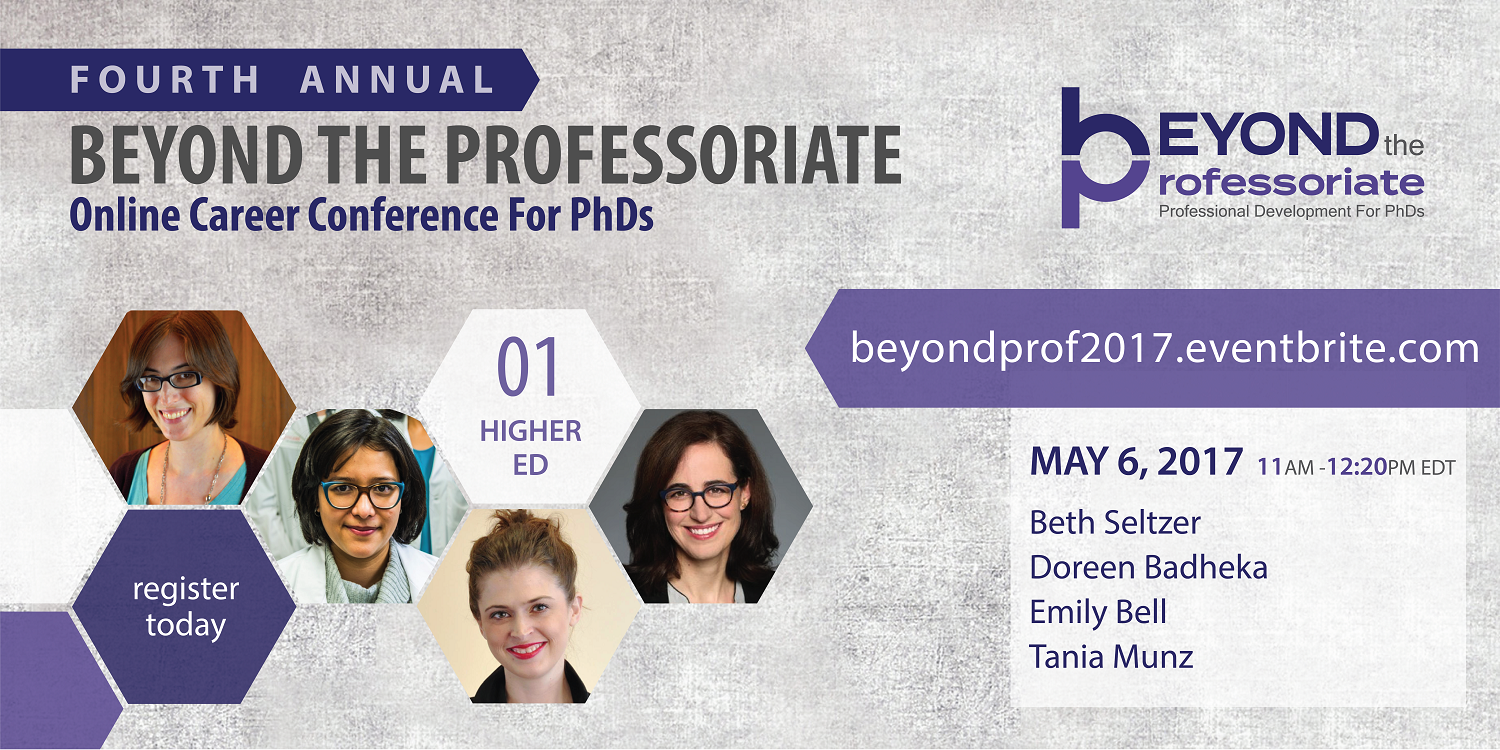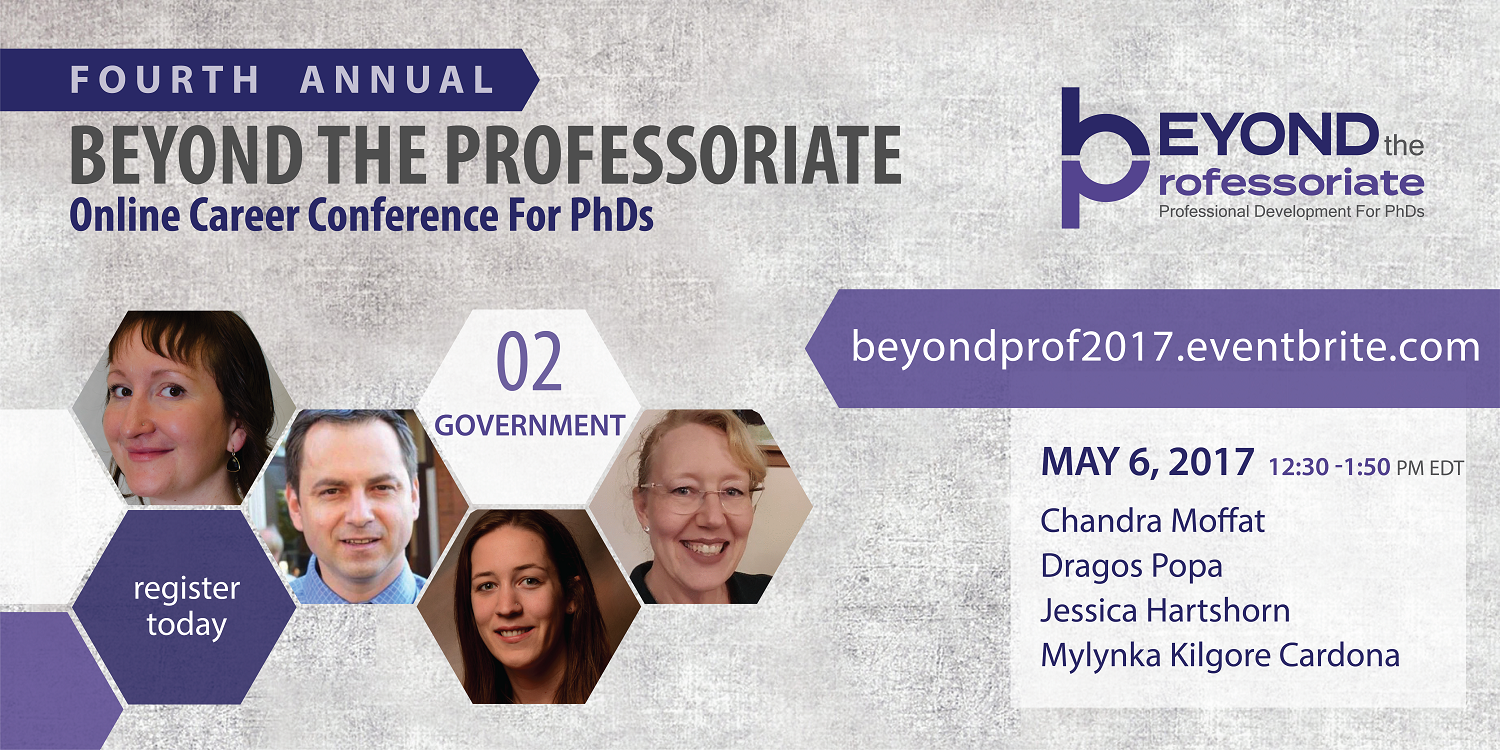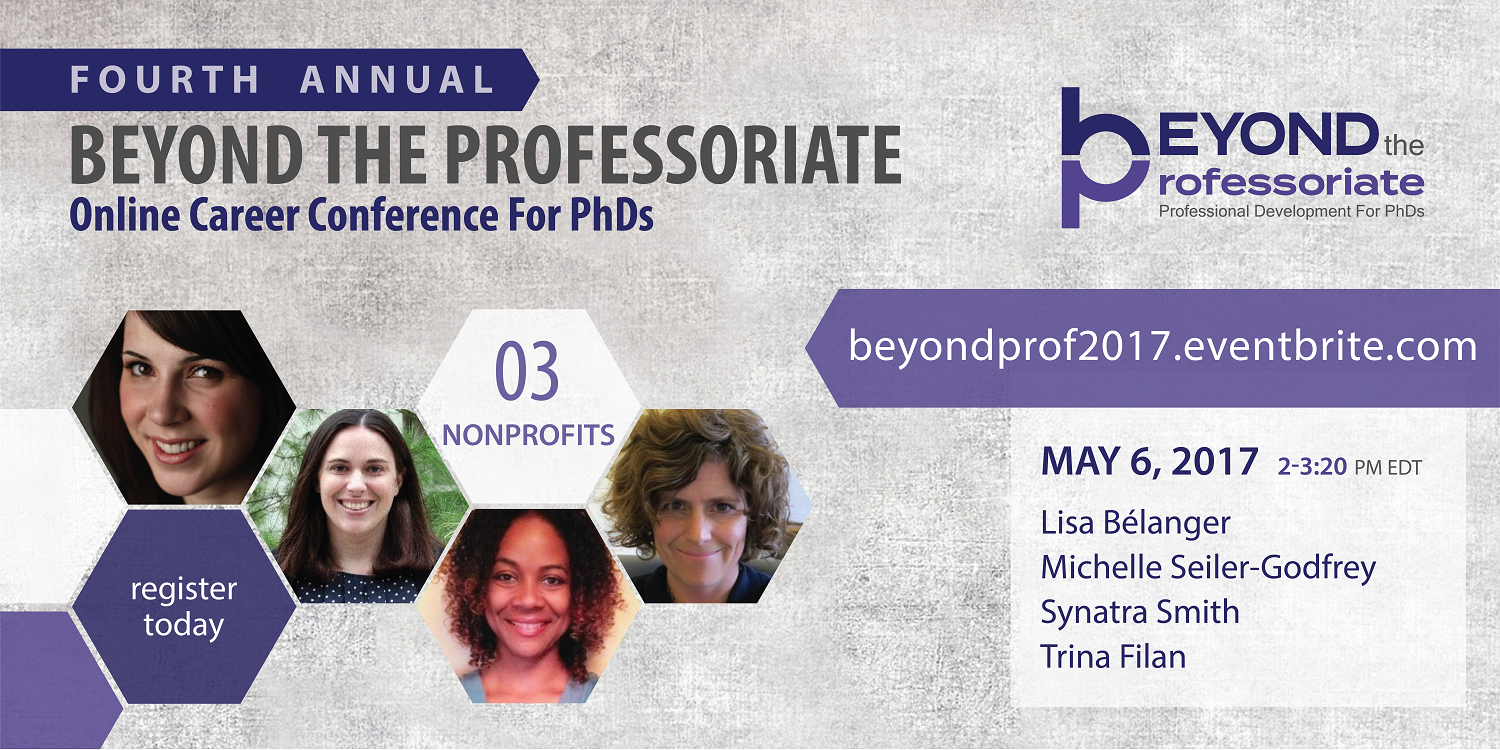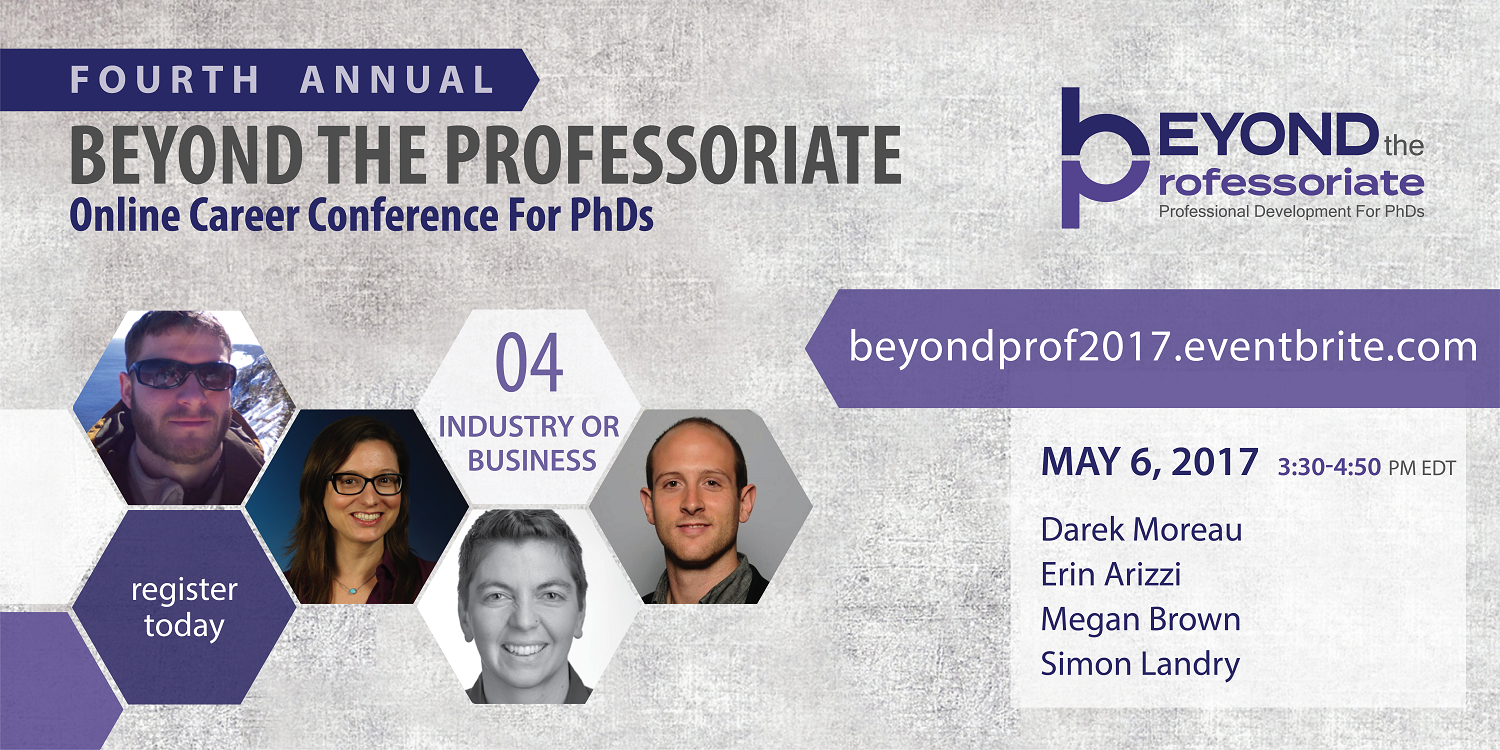I’m gearing up to co-host the Beyond the Professoriate conference once again this May. It’s the fourth annual event, and there’s a great lineup of speakers presenting. I asked our Day 1 (Career Day) panellists to share advice they have for graduate students and PhDs who are seeking – or at least considering – non-faculty careers. How can they manage an effective job search campaign? Here’s what they told me.
Explore your options
PhDs can feel boxed into a limited range of job options, particularly just after graduate school or a postdoc. But doctoral degree holders work in a wide range of roles. I myself work as a life coach and entrepreneur, hardly what I expected I’d do after a history PhD! Career exploration was crucial in my case: I felt lukewarm about all the choices I thought I had; I needed to look elsewhere.
“Don’t be afraid to explore options that are outside your comfort zone,” says Jessica Hartshorn, a forest health specialist for the Minnesota department of natural resources. She encourages new grads to try different things. “People get tunnel vision in the job market and often forget that it’s okay to try things and move on. No matter what you do you will learn a lot about your field, and about yourself, and nothing is permanent.” Dr. Hartshorn echoes what my conference co-host Maren Wood tells PhDs: “Your first job is not your last job.”
One challenge for academics seeking non-faculty work is that they are used to their content knowledge – their research expertise – being of primary importance to their careers. Sometimes, that remains true of their work beyond the professoriate. Chandra Moffat, a PhD in evolutionary ecology turned research scientist for Agriculture and Agri-Food Canada, can speak to this. Others need not dismiss their research entirely. Beth Seltzer points out that “dissertations can provide a clue to the types of issues you might be interested in working on in a non-faculty career. For me, I started out interested in Victorian information technology long before I realized I was interested in technology use today too.” Dr. Seltzer is currently an education technology specialist at Bryn Mawr College.
Know and apply your skills, confidently
Lisa Bélanger advises PhDs to look at their degrees as a collection of skills. “No one – and I mean no one – cares if you have publications,” she emphasizes. “What matters most are your skill sets, your network, and your experience.” (Read more about Dr. Bélanger’s career on this Transition Q & A and hear her speak as part of the Non-profit panel at the conference.)
“Apply all the skills you learned while earning your PhD to building up your professional network.” That’s advice Erin Arizzi gives graduate students and postdocs seeking employment beyond the professoriate. Dr. Arizzi earned a doctorate in the humanities and now works as a communications specialist at a software company in North Carolina. Networking is key to any job search, and that includes PhDs.
In terms of what skills PhDs bring to employers, Mylynka Kilgore Cardona argues it’s easy to overlook them all. “We are so conditioned in grad school to reach for a tenure-track job that we forget that we have a lot of skills that are really desirable in the non-academic world. All of the things I do in my day-to-day work are things I honed in my doctoral program – research, writing, editing, project management, public speaking. These skills are so valued outside academia and are wanted!” Dr. Cardona did a PhD in history and now works as a map curator at the Texas General Land Office. “I think the most important piece of advice I would give to academics seeking non-faculty positions is to be confident in your abilities,” she says.
Translate your skills, redefine your professional identity, and market yourself effectively
According to Darek Moreau, PhDs should “learn how skills and experiences gained in academia translate into other career paths.” He sees graduate degree holders struggle to match up their knowledge and skills with job postings. “A lot of this simply comes down to unfamiliar jargon,” Dr. Moreau says. He’s had varied professional experiences after earning his PhD in biology and now works as a senior aquatic scientist for Stantec Consulting in Fredericton, New Brunswick.
In his own career, Dr. Moreau found his doctoral experience set him up well for future roles. “Most surprising to me is how research strengths can be applied to a wide array of day-to-day activities in the jobs I’ve had since graduating. It’s inspiring to see how my skills can make novel contributions in areas I’d never imagined.”
In addition to translating academic experiences into language employers understand, job seekers may have to “morph strategically” to effectively and persuasively communicate with hiring managers. That advice comes from Trina Filan, a geography PhD who works in the nonprofit sector. Dr. Filan warns that this morphing isn’t simply a matter of assessing skills and crafting a compelling resume. It can get at the heart of who you are. “In some cases, that might mean that the person you’ve become during your doctoral work must be subsumed into a new identity, someone you may not be entirely comfortable with becoming but who is palatable to the people who will offer you employment.”
The emotional, psychological journey that many PhDs transitioning into nonfaculty careers go through is something I know well from my own experience and client work over the years.
One thing that’s often surprising to academics is how different markers of success and accomplishments can be beyond the professoriate. “As scientists we have our published articles and that’s mainly how we define our value in academia,” points out Simon Landry, a recent biomedical sciences PhD now working at a startup company in Toronto. In the non-academic world, he says, individuals have more flexibility to brand themselves in different ways.
Proving your value is done differently beyond the professoriate. Dr. Arizzi agrees. “It’s a tough lesson, but no one cares about your academic accomplishments or where you went to school. You’re going to have to prove your value all over again by doing good work, and working well with others.” She cautions academics to manage their expectations. If they’re entering a new industry, they may need to begin in a more entry-level role than they imagine.
Be patient and follow your gut
Synatra Smith’s experience is instructive. “It took me a year after graduating to stumble upon something I was passionate about that makes me feel like 10 years of college and terminal degree level debt was worth it,” she reflects. “It took another five months of volunteering to get hired in a position that has been molded to reflect my interests,” says Dr. Smith. She now works as education coordinator and scholar in residence at the Prince George’s African American museum and cultural center in Maryland. Her advice? “Be patient, think outside the box, try on different things.”
Dr. Moffat, the entomologist, advises academics seeking non-faculty roles to “listen to your gut.” She says not to worry about what others think about your career path. And, she adds, keep in mind that what works for someone else isn’t necessarily right for you.
At the end of the day, many doctorate degree holders work in roles where they do work they find meaningful, rewarding, and engaging, even if it looks different from how they imagined it would. “The most surprising thing about work after my PhD is that I’m still finding meaningful research questions, just in a different context,” says Megan Brown, a psychology PhD who works as a data scientist at Amazon. “Ultimately, I’m still motivated by the same things: making life better for people based on research, interesting questions, and teamwork.”
Non-academic lifestyles can be better, too. “I have way more free time to do what I want and build my life the way I want,” Dr. Hartshorn told me. “In grad school I was a non-stop mess of anxiety and now I’m able to explore new hobbies and spend more time with my family.” Dr. Brown similarly emphasized her appreciation for weekends off and vacation time.
A final piece of advice comes from Emily Bell, a psychiatry PhD who works at McGill University as a training manager. Dr. Bell finds that her students and postdocs often want discipline-specific advice and information on job searching. She tells them that “a job search is roughly the same for everyone.” That’s good news, says Dr. Bell. “You are not alone and your non-academic friends, relatives and colleagues may be able to share strategies, resources or documents that they used in the process of searching for work or new opportunities.”
Hear from all these PhDs and others during Career Day on Saturday, May 6, part of the Beyond the Professoriate online career conference. Read the full conference program, check out the speaker bios, and register online. Group discounts available for institutions purchasing on behalf of their students or postdocs.





Do we need all these posts by a consulting company aimed at taking advantage of the fears and anxieties of PhD students and post-docs? Regardless of the content, they are essentially ads.
Yes we do need this. 1.) Look at the stats for PhD grads and academic jobs, 2.) Look at the lack of support and guidance for alt-ac career paths for those seeking this either because it is their preference, or by default due to job market. This is not taking advantage of fears and anxieties, it is help to relieve them!
Furthermore, if she were to not identify herself and her work (as she does here discretely) this and other articles would not hold as much weight, nor be taken seriously. I very much enjoy Jennifer’s contributions to UA and elsewhere, along with others offering us guidance on alt-ac paths. I do not find these posts to be “essentially ads” and look forward to future articles!
Part of the literature in my dissertation is related to the lack of appropriate career services for doctoral graduates. More than 60% of doctoral graduates will NOT become employed as full-time faculty members, yet faculty tend to view a successful graduate as one who gets a tenure-track position at a large research university. Faculty train and socialize their students toward these types of jobs, but they’re not the reality for most graduates. Jennifer is clear about her role as a consultant, and she fills a very needed role in doctoral education.
Hello Jennifer!
Frequently visit GTA – would like to meet to discuss “Beyond the Professoriate” thinking….
If you review my LinkedIn profile, I worked in industry for over 30 years, mostly in technical leadership roles, now “semi-retired” I teach at several universities but also assist them with many administrative/advising tasks.
Email given below…
Please connect!
Thanks!
Heinz
Happy to chat! Email me at [email protected] or tweet me @FromPhDtoLife. I tried emailing you using the address you provided, but I got an error message.
Essentially to be successful in most non-academic jobs, PHD graduates have to abandon the ‘individualistic’ academic mindset that puts you and your scholarly mind at the centre of things, and learn to adopt, and adapt to, a corporate mindset (i.e. finding satisfaction is being a part of an organization, corporate loyalty, being able to dissolve your ‘ego’ in the corporate culture and be seen as part of the ‘team’).
I know this is an old article, nevertheless….. I have work experience and PhD experience in the same field but the company where I interviewed (working in the same field) wanted to pay me 30% less than what they had advertised. To them the pay was a step-up compared to the below minimum wage of my PhD fellowships.
Dear Jennifer Polk,
Your articles and comments are very useful. I am looking for non-academic jobs in Montreal. Do you know any francophone advisor like you but speak french and based in Montreal?